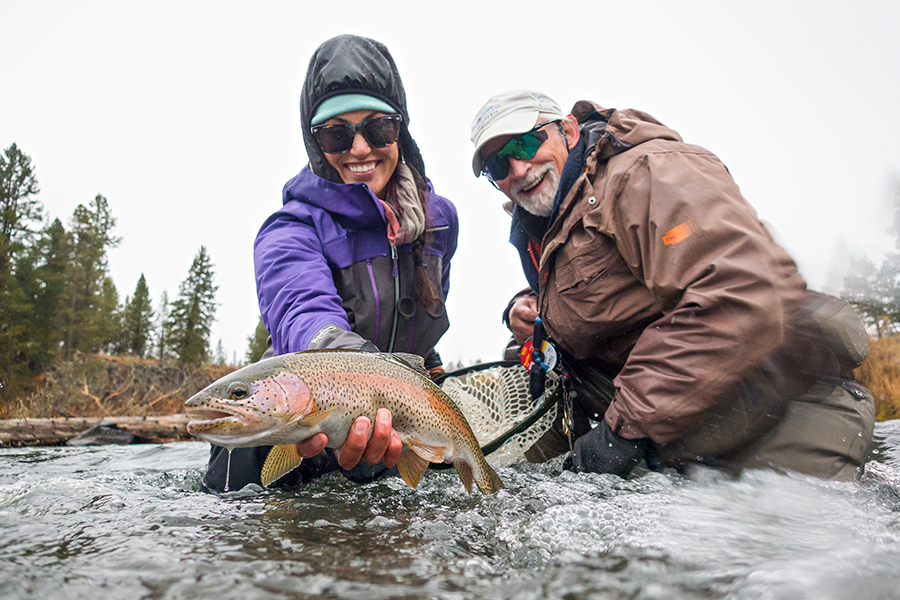School of Trout Schools Anglers
Bigfork-based fly fishing writer and conservationist brings expert anglers to second-annual instructional retreat
By Tristan Scott
Todd Tanner likens the educational value of his School of Trout to earning a master’s degree from the top fly fishers in the world, or to attending a fantasy camp where an all-star roster of anglers is on hand to teach the finer points of their beloved sport.
“There is a tremendous amount of accumulated fishing wisdom in the room and on the river,” Tanner said. “In my mind, it’s some of the best fly fishing instructors in the world, and the school is essentially deep immersion.”
Tanner is the brainchild behind School of Trout, which meets Aug. 25-29 on the Henry’s Fork in Last Chance, Idaho for an “advanced class,” while a subsequent “basic class” converges at the same location Oct. 6-12.
Now in its second year, School of Trout might not seem like a major departure from the normal course of Tanner’s livelihood, which involves fishing, writing about fishing and running the nonprofit Conservation Hawks, which educates hunters and anglers on the threat of climate change and other human-caused environmental detriments.
Still, given the high degree of talent Tanner has culled from all corners of the fly fishing industry, and the pristine stretch of water on which students can ply their developing skills, it’s clear that School of Trout was a heavy lift by a heavyweight in the world of trout fishing.
As a former fly fishing guide and longtime fly fishing writer, Tanner has established lines of communication with some of the most revered names in fly fishing, including icons like Tom Rosenbauer, Bob White, Kirk Deeter, Tom Romano, Hilary Hutcheson, John Juracek, and Craig Mathews.
So why would someone drop a sizable chunk of change — the cost of the weeklong “basic class” is similar to a fully guided Alaskan fishing trip — to surround themselves with some of the best in the business?
To develop an independent foundation of angling skills and an appreciation for fly fishing they can take home with them, Tanner says.
“My perspective is actually pretty simple. There are a ton of folks who are happy to fly to a fancy fishing lodge and jump in a boat with a guide and spend a week lobbing a big orange bobber and a couple of weighted nymphs into the river as they float downstream,” he said. “While there’s nothing inherently wrong with that approach — fly fishing is ultimately about having a good time, and if folks enjoy that kind of thing, then more power to them — School of Trout is diametrically opposed to that type of mindless fishing. We’re looking for students who are drawn to the beauty and grace of the sport, and who want to understand it at a really substantive level, and who want to learn how to fish on their own rather than relying on a guide.”
The classes take place at TroutHunter in Last Chance, Idaho, at a lodge where Tanner previously worked as a guide on the famed Henry’s Fork, a tributary of the Snake River. Back in the 90s, a fly fisherman from San Francisco named Andre Puyans ran a fly fishing school, teaching students on the Henry’s Fork. Tanner had the idea to tweak Puyan’s methods and assemble a cast of well-known figures in fly fishing.
“I am pretty lucky in that a lot of the big names in the fly fishing world are friends of mine,” Tanner said. “I thought it would be cool to bring in some really ace names and have them rotate through at the lodge. I wasn’t sure how it was going to go, but we ran one class last year and it filled up. The students loved it, the instructors are all coming back and it was a success.”
Describing the Henry’s Fork as the “spiritual center of the fly fishing universe,” Tanner said it’s the best dry fly water that he’s ever fished, and he picked it as his new school’s host water to instill that special sense of place in his students.
Although School of Trout’s instructors focus on practical angling skill development, technique and methods, Tanner said conservation ethics and other less tangible tools are also encouraged — like learning to sit down, look at the water and pay attention to what’s happening in the natural world.
“The whole ethos of the school is predicated on treating everything around you with respect. We all want to go out there and leave things better than when we arrived,” he said. “It’s a little bit of a conundrum because we are hooking these creatures and hauling them from the water and then letting them go and saying, ‘no harm no foul,’ and the only reason that’s morally defensible is if we do everything as ethically as possible.”
A few slots are still available in both the advanced and basic classes. Learn more or apply at schooloftrout.com.